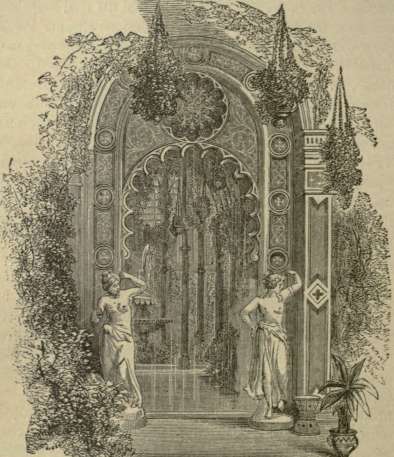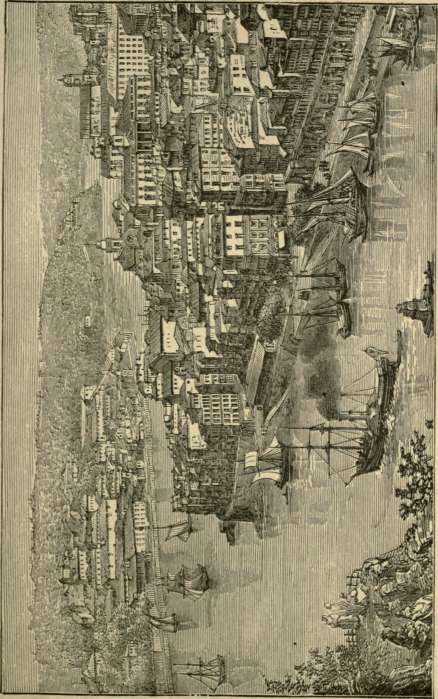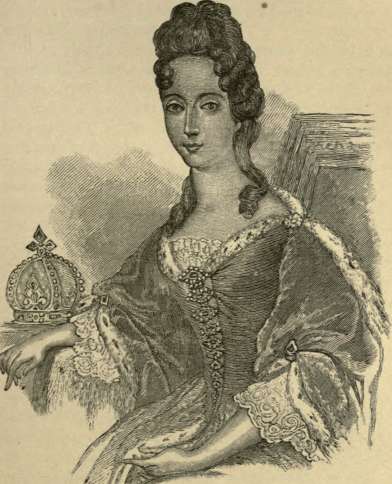Agnes Strickland's Queens of England (22 page)
Read Agnes Strickland's Queens of England Online
Authors: 1796-1874 Agnes Strickland,1794-1875 Elizabeth Strickland,Rosalie Kaufman
Tags: #Queens -- Great Britain
The Qiieetis of England.
The queen's birthday that year was celebrated with great splendor, and there was the finest display of fireworks in front of the palace ever seen in England. The same night

.^^
THE queen's bower.
there was a grand ball, at which all the court ladies and gentlemen danced in costumes that were unsually rich and elegant.
[A.D. 1685.] This was the last entertainment that King Charles ever attended, for on the second of February of the following year he had an attack' of apoplexy that resulted in death four days later. He was bled until he was almost exhausted, and then his bedroom was so crowded with people, night and day, that he had little chance of recovery. Most of the time it contained five bishops, twenty-five lords, the councillors, foreign ambassadors, doctors, and attendants, besides the queen, and the Duke and Duchess of York.
The queen was overcome with grief, and once when the dying man sent for her she was too convulsed to attend, but sent a messenger to beg his pardon if ever she had offended him. "Alas, poor lady!" exclaimed Charles, *' she begs my pardon ! I beg hers with all my heart." After that she took her place at his bedside and stayed with him to the end.
Both the Duke of York and Catharine were exceedingly anxious that the king should receive the last rites of the Catholic church, because they knew it was what he would prefer if he were conscious of his danger, but they dared not propose it, as it was contrary to the laws of England for any one to influence another in that direction. At last the French ambassador consulted the Duke of York on the subject, and impressed upon him the necessity of having extreme unction administered before it was too late.
Returning to his brother's room, the duke knelt by the bed and asked in a low voice : " Sir, will you receive the sacrament of the Catholic church ? "
" Ah! I would give anything in the world to have a priest," faintly replied the dying monarch. " I will bring you one," returned the duke. " For God's sake, brother, do!" exclaimed the king. Then he added : " But will you not expose yourself to danger by doing it ? "
" Sir, though it cost me my life, I will bring you one,'" said the duke.
Father "Huddleston was selected, because for many reasons he was the least objectionable of the Catholic priests in England, and had for many years been a personal friend to the king, whose hfe he had once saved. He arrived between seven and eight o'clock on the evening of the fifth. Now it became necessary to clear the sick-room of those who would have objected to the performance of the Cath-ohc rites; the Duke of York managed the difficult matter in this way : —
Kneeling down by his dying brother he whispered " that all things were ready and Father Huddleston in attendance, and asked if he would see him ? "
" Yes, with all my heart! " eagerly replied Charles, m a loud voice.
Turning to the room-full of people, the duke said : " Gentlemen, his majesty wishes every one to withdraw but the Earls of Bath and Feversham."
Then Father Huddleston, disguised in a wig and cassock, such as the clergy of the Church of England always wore, was led up a secret staircase, through the queen's apartments, into the king's room.
As he entered the alcove in which stood the king's bed, the duke presented him, saying: " Sir, I bring you a man who once saved your life; he now comes to save your soul."
Charles replied, in a weak voice, " He is welcome."
At the conclusion of the Romish rites the company were readmitted; and Kean, an English p^inister, prayed with the king.
During the night the dying mar apoke affectionately to his brother, and asked forgiveness of his wife. At six in the morning he asked the time, and said : " Draw the cur-

tain, and open the window, that I may behold the light of the sun for the last time."
Before noon Charles 11, expired, in the fifty-fourth year of his age. He was buried on the fourteenth of February, at Westminster Abbey, after lying in state for a week. He was deeply mourned by his subjects; for no sovereign ever had the attributes of popularity more fully developed than King Charles H.
Queen Catharine's grief on account of the death of her husband was great. The new king treated her with kindness and consideration. She was permitted to retain her rooms at Whitehall as long as she chose ; but on the eighth of April, after two months of mourning, she removed to Somerset House, where she established her court as queen-dowager.
Catharine no longer danced or took part in gayety of any kitW ; but she indulged her love for music by giving regular concerts at Somerset House.
[A.D. 1688-9.] Several times she made up her mind to return to her native land, but fortunately did not do so ; for if she had she would have lost every penny of her dower as queen-dowager during the Revolution, which terminated in the exile of James H. and his family, and the placing of the Prince of Orange on the throne of England, She wisely weathered the storm, although she was subjected to many mortifications and insults in consequence.
After William HI. was on the throne he had occasion to go to Ireland ; so before departing he sent Lord Nottingham to tell Catharine that he had heard of certain meetings, held at Somerset House, for the purpose of denouncing his government; he therefore desired her to remove either to Windsor or Audley End.
Astonished at such a message, but not in the least alarmed, she replied : " That it was her desire to quit his
territory for Portugal, if he would but have appointed ships for her voyage; but, as it was, she did not intend to go out of her own house."
The next day William sent profuse apologies, and bade the queen " not to think of removing."
[A.D. 1692.] A few months later the royal widow gave notice of her intention to leave England; but it was not until the spring of 1692 that she was able to carr}- it into effect. She had then been living in retirement for several years, and had saved a large sum of money to carry back to Portugal.
Several English ladies of rank attended her; and as soon as Louis XIV. heard of her arrival in France he sent an escort to conduct her through his dominion. But she was so anxious to get to her native land that she would not accept the invitation he extended her to visit his court. *
Queen Catharine was met on the Spanish border by a train of Portuguese nobles of the highest rank; and on her arrival at Lisbon she was greeted with the most enthusiastic welcome.
Don Pedro met her on the road in grand state. He descended from his carriage and went to the door of hers; then, after an affectionate embrace, the queen alighted, entered her brother's coach, and was conducted in procession to one of the country palaces that had been prepared for her. The Queen of Portugal, Donna Maria Sophia, received her at the head of the grand staircase, and after the observance of all the regular court ceremonies, went home with her husband, to enable the tired traveller to rest.
[A.D. 1704.] When Don Pedro was obliged some years later, for the sake of policy, to withdraw from the cares of government, he left the charge of his dominions entirely tr
his sister Catharine, and when he was dangerously ill the following year, she was solemnly constituted Queen-regent of Portugal.
[A.D. 1705.] The country was then engaged in a war with the King of Spain, and " Donna Catharine " conducted the campaign with such skill that her popularity increased tenfold.
A sudden attack of colic put an end to her existence the very last day of the year that had been such a brilliant success to her. The king, her brother, hastened to her as soon as he heard of her illness, but arrived only an hour before she expired.
Queen Catharine left liberal legacies to all her relations, though Don Pedro was her heir. The poor were not forgotten, and various monasteries were provided for by her will. She had chosen the royal monastery of Belem for the place of her interment, and the funeral ceremony was performed with all the grandeur and solemnity that would have been observed if Catharine of Braganza had been a reigning sovereign. Her bier was carried by eight noblemen of the very highest rank to the litter, on which it was conveyed to Belem, attended by all her retinue, and by the whole court of the king, her brother.
As a testimony of respect all public buildings, business-houses, and places of amusement were closed for a week, and the court wore mourning for a year.
Catharine was greatly lamented in Portugal, where even to the present day her name is mentioned with the utmost veneration. She outlived Charles 11. twenty-one years, and was devoted to his memory until she died.
CHAPTER IX.
MARY BEATRICE OF MODENA, QUEEN-CONSORT OF JAMES II. (A.D. 1659-1718.)
The city of Modena in Italy was the birthplace of some of the greatest poets and painters of that land of artists, and it was there that the heroine of this narrative was born. Her father, the Duke of Modena, was a learned^ man, and would probably have made his mark in the world if he had lived long enough; but he died young, and left his Duchess Laura to rule in his stead.
This lady had two little children, a boy, who later became Francis H. of Modena, and Mary Beatrice. Prince Rinaldo d'Est^, afterwards a cardinal, was appointed guardian of the children, and assisted their mother in educating them.
Francisco, as the boy was called during his minority, was two years younger than his sister, consequently when his father died the duchess ruled the state many years before he was fit to do so.
She was rather a stern mother, — her fear, lest overindulgence might spoil her little ones, making her notice trifling faults that in some instances it would have been wiser to have overlooked. She insisted upon hard study several hours every day, and never allowed any of the fasts imposed by the church to be omitted, though both the children were delicate. When Mary Beatrice was frightened at seeing a chimney-sweep descend into her nursery through the fireplace, her mother made the man remain until she had shown the child who he was, and explained 238

MARY BEATRICE.
why he looked so black and dirty. On one occasion the attention of the duchess-regent was drawn to the fact that hard study was wearing upon the young duke's health. " Better that I should have no son, than a son without wit and merit," replied the parent.
[A.D. 1666.] Mary's first real sorrow was when her governess, of whom she was very fond, entered a conver)t, and she grieved so sorely that she was sent to the same institution to finish her education. There she spent several happy years; for the discipline was much less rigid than it had been at the palace, and she had the companionship of girls of her own age. The books that were placed in her hands, and the influence by which Mary was surrounded at the convent, filled her youthful mind with mystic romance, and gave her a desire to imitate the female saints whose lives had been devoted to the service of God. Besides, she had an aunt in the convent, scarcely fifteen years older than herself, who was preparing to take the veil, and Mary Beatrice loved her so much that she desired to follow her example. But she was not to lead a life of peace and repose: a different destiny awaited her, as we shall see.